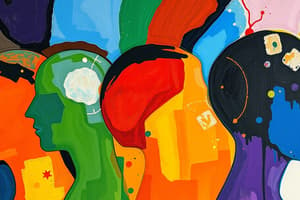Podcast
Questions and Answers
What is the characteristic of epigenetics?
What is the characteristic of epigenetics?
- It involves changes in genes influenced by the environment. (correct)
- It refers to stable traits passed from parents.
- It affects only physical traits and not behaviors.
- It is a method of genetic modification.
What does the term 'maturation' refer to in the context of development?
What does the term 'maturation' refer to in the context of development?
- The natural unfolding of physical changes and behaviors. (correct)
- The immediate changes due to environmental changes.
- The social experiences shaping behavior patterns.
- The gradual accumulation of learned experiences.
How do developmentalists view the role of heredity and early experiences?
How do developmentalists view the role of heredity and early experiences?
- They suggest they may lead to stability in development. (correct)
- They argue these contribute to instability in development.
- They think these factors are less important than environmental influences.
- They believe these have no effect on future development.
Which concept describes the gradual changes in development?
Which concept describes the gradual changes in development?
What does the stability-change issue in development primarily concern?
What does the stability-change issue in development primarily concern?
Which of the following best describes the life span development concept?
Which of the following best describes the life span development concept?
What does human development primarily encompass?
What does human development primarily encompass?
What is one of the goals of studying human development?
What is one of the goals of studying human development?
What aspect does the life-span developmentalist emphasize?
What aspect does the life-span developmentalist emphasize?
Which of the following is NOT one of the domains of development?
Which of the following is NOT one of the domains of development?
Which statement about the division of the life span into periods is accurate?
Which statement about the division of the life span into periods is accurate?
What does heredity refer to in the context of human development?
What does heredity refer to in the context of human development?
What characterizes the third age in life-span development according to developmentalists?
What characterizes the third age in life-span development according to developmentalists?
Flashcards are hidden until you start studying
Study Notes
Human Development
- Human development encompasses physical, cognitive, and psychosocial changes throughout a person's life.
- Research findings often have practical applications in education and social policy.
Life-Span Development
- Life-span development is a continuous process from conception to death.
- Events such as parenthood, work, and marital satisfaction are now studied within developmental psychology.
Goals of Studying Human Development
- Describe: Identifying typical developmental patterns.
- Explain: Understanding the reasons behind developmental variations (e.g., delayed language).
- Predict: Anticipating the likelihood of future developmental outcomes (e.g., speech problems).
- Intervene: Developing strategies to address developmental challenges (e.g., speech therapy).
Domains of Development
- Physical development: Growth of the body and brain, sensory abilities, motor skills, and health.
- Cognitive development: Learning, attention, memory, language, thinking, reasoning, and creativity.
- Psychosocial development: Emotions, personality, and social relationships.
- These domains are interconnected.
Basic Concepts
- Periods of the Life Span: The division of the human lifespan into stages is a social construction influenced by cultural norms.
- Developmental Tasks: Certain needs must be met and tasks mastered for typical development at each stage.
- Life-Span Developmentalists: Focus on adult development and aging, often describing it in four "ages":
- First Age: Childhood to adolescence.
- Second Age: Prime adulthood (20s to 50s).
- Third Age: 60s to 79 years old.
- Fourth Age: 80 years old and beyond.
Influences on Development
- Nature vs. Nurture:
- Heredity: Inborn traits and characteristics inherited from biological parents.
- Environment: External factors influencing development from prenatal life onward.
- Epigenetics: The impact of environment on gene expression.
- Stability vs. Change:
- The extent to which early traits persist or change throughout life.
- Heredity and early experiences often contribute to stability.
- Continuity vs. Discontinuity:
- Continuity: Gradual, cumulative development.
- Discontinuity: Development in distinct stages.
- Maturation:
- The unfolding of natural physical and behavioral changes.
- Becomes increasingly influenced by individual differences and life experiences.
- Continues to affect biological processes like brain development throughout life.
Evaluating Developmental Issues
- Most developmentalists do not take extreme positions on nature vs. nurture, stability vs. change, and continuity vs. discontinuity.
- These issues are debated regarding their influence on development.
- Individual rate and timing of development vary.
Studying That Suits You
Use AI to generate personalized quizzes and flashcards to suit your learning preferences.




